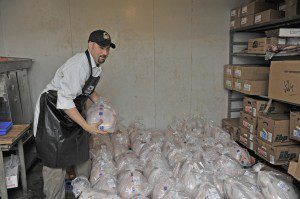
Dan Puza Jr., an employee at the North Elm Butcher Block in Westfield, searches through a batch of fresh turkeys for a customer, who requested a specific weight. (Photo by Frederick Gore)
WESTFIELD – With thousands of families across the Commonwealth getting ready for Thanksgiving, Massachusetts consumers can feel confident they are getting what they pay for at the meat counter after a surprise inspection by the state’s Division of Standards showed that over 97 percent of items were accurately weighed and labeled
Compliance Officers with the DOS inspected over 1,200 prepackaged meat items in approximately 50 supermarkets statewide on the weekends of October 5 and 12, and discovered that 97.4 percent of the items were correctly weighed and labeled.
Random packaged meats were weighed and checked to see whether the weight labeled on the package was correct. Items found to be underweight did not account for the full packaging “tare weight,” meaning that consumers would be paying for the weight of the packaging material.
The DOS can fine a store $75 per violation if the actual weight of the package is less than the stated package label weight, or if numerous items in the establishment are found to be mislabeled and underweight.
“It is important that businesses are honest with consumers, and the results of this survey demonstrate that Massachusetts grocers are treating their customers with respect,” said Barbara Anthony, undersecretary of consumer affairs and business regulation. “The trust between a business and its patrons is the foundation of a strong economy.”
Of the checked items in the 50 stores, almost 87 percent of products were found to be at the “correct weight”; nearly 11 percent were found to be “slightly overweight”, containing more than the marked weight and price on the package.
Just under three percent of products were found to be “slightly below the marked weight and price, which would have resulted in overcharges to the consumer”.
According to the DOS, the average overcharge amount was eleven cents, while the average amount undercharged was nine cents.
DOS inspectors charged Stop and Shop supermarkets in Attleboro and Braintree with civil citations for one underweight item and five underweight items, respectively, which cost the two establishments a combined $225 for $1.77 in overcharges.
In greater Westfield, supermarkets were accurate, if not generous, with their packaged meats.
In Westfield, the Big Y and the Super Stop and Shop, both on East Main Street, were inspected on October 6, with 26 items being inspected in both stores.
Eighteen and 16 items in the two establishments were weighed correctly, with the remaining items weighing in over their labels, undercharging their customers by 37 and 80 cents, respectively.
The only other supermarket in greater Westfield which was inspected was the Big Y on College Highway in Southwick, which passed with flying colors, as all 26 of it’s items weighed on October 5 were correctly labeled.
Dan Puza, owner of the North Elm Butcher Block, said that Westfield Inspector of Weights and Measures Rob Popko is in his shop every six months checking his five scales, and that a state inspector visits once a year.
“We have excellent relationship with Rob,” said Puza, whose family has owned the shop since 1947.
Charles Carroll, director of the Commonwealth of Massachusetts’ Division of Standards, said that the statewide inspections have been done periodically for some time now.
“We do them from time to time, and like to do them on weekends,” he said. “If you do them on weekends, it’s prime time for when people would cheat (on weights). We try to get the maximum out of our inspections.”
When asked whether Westfield residents should be concerned that the two supermarkets that overweighed and undercharged in the city are an indication of inexact measurements, Carroll dismissed the notion.
“Meat products experience shrinkage, depending on how long they’ve been there,” he said. “Stores that overweighed are just trying to be proactive. It shows concern for the measurements, and they just want to make sure.”
Carroll also said that the amounts overweighed at the East Main Street Big Y and Super Stop and Shop supermarkets “wasn’t much”, and believed the checks indicated a “very high percentage” of accuracy statewide.
“It’s a big time of year,” he added. “People are buying more food than they need to make sure everyone gets enough. And because of that, it’s a good time of year to do these checks.”

